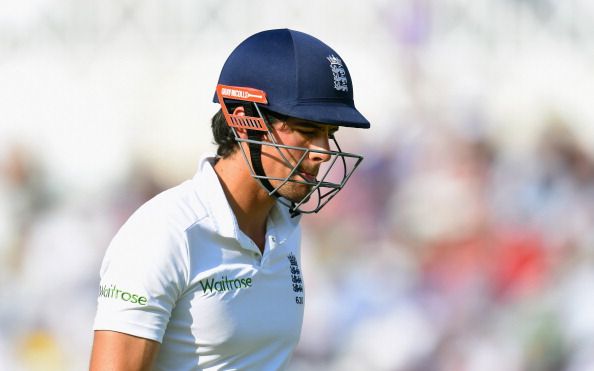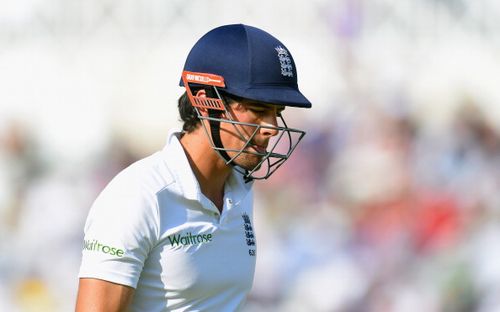
Alastair Cook and the passive regression of English cricket

One could blame everything that went wrong for England on anything and anyone. The pitch at Trent Bridge, the curator responsible for coming up with such a pitch, the powerful start that Murali Vijay provided and the record last wicket stand that addled the entire English bowling order. Or maybe, blame for some of these things – the more tangible and concrete ones – can be placed on Alastair Cook, the man who’s leading the team.
A comforatble situation gone awry
Once a first-choice for the English Test captaincy, Cook’s performances – both as a batsman and a leader – have made him out to be anachronism as far as the needs of the present squad go. The runs aren’t free flowing from his bat and nor are his decisions making any positive impact on the team’s credentials. The same team which, just a year ago not only decisively retained the Ashes but before that, mounted a comprehensive win over India, in India.
Cook’s assertiveness once so visible in his decision-making now has dwindled to an almost ad-hoc manner, sinking deeper than the dregs of mediocrity. His replies in post-match conferences don’t look like responses from a man confident about his team making a comeback from whatever-it-is-that-ails-them, but resembles someone who uses defence as a form of counter-attack.
The team’s miserable run can somewhere be attributed to their increasingly failing fortunes thanks to certain unexpected retirements and pull-outs. The absence of several senior members of the squad would be hurting England as has been stinging the unwanted dispute with Kevin Pietersen, leading to his ouster from the team. But rather than stand up making a more forceful statement on the field, Cook’s shrouding of the team into a passively lethargic outfit has done more damage for them than allow for reorganising.
Cook the captain is affecting Cook the batsman
And if this transformation of the team couldn’t have been any surprising, the personal batting struggles of the south-paw are an altogether different matter.
Once where England could rely on him to give them the necessary strong start to their innings, Cook’s erratic batting has become an encumbrance. To the point where his very selection in the team has become a huge point of contention.
In the last five innings – including his first innings score against India in the first Test – the English skipper has averaged a paltry 16.6 runs with a highest total of 28 scored in the first Test against Sri Lanka. Granted that the loss of his wicket against India was more on the lines of being unlucky than being bamboozled by some extraordinary delivery, it was however his price to pay for defensively nudging the ball when he could have opted for a better shot.
Experience must show
Such poor shot selection, coming from a veteran – in fact the player with the most Test caps in the present English team – doesn’t bode well. Not for the player himself and definitely not for the team.
Defiant he may be regarding retaining his captaincy, but defiance isn’t going to do well for the 29-year-old if these inexplicable vulnerabilities continue to make themselves felt.
These vulnerabilities however aren’t unique to Cook alone. Many of his skippering predecessors have gone through this impasse where balancing captaincy of the team and personal contributions become difficult and unmanageable. There’s no time limit to when it can occur and several illustrious captains from across cricketing history have, at some point or other, struggled to get past this vortex.
But the names of those who have come out unscathed, while managing to preserve both – their position as the captain and team-member – is absolutely rare. Making a choice is thus inevitable. And the nature of the sport is such that there is invariably just one option to decide, if the player is really keen on continuing and prolonging his active association with it.
A break from international cricket might be the need of the hour
Cook, as such, needn’t hesitate to take the first step towards ensuring his rehabilitation in Test cricket despite the national selectors still preferring him to handle the captaincy role. His prolific rise through the ranks of county cricket is well documented, as is the sporadic nature of his participation in county events following his selection in the national squad.
Given that the youngsters are doing their bit for the team, the left-handed opening batsman can well afford the option to take a voluntary step back. Try to re-evaluate and re-discover his form and confidence by playing more county matches and then try to make a comeback.
For history knows, it’s always better if the player exercises the option rather than the team management, whose decision-making can strike brutally at players’ careers when warranted.